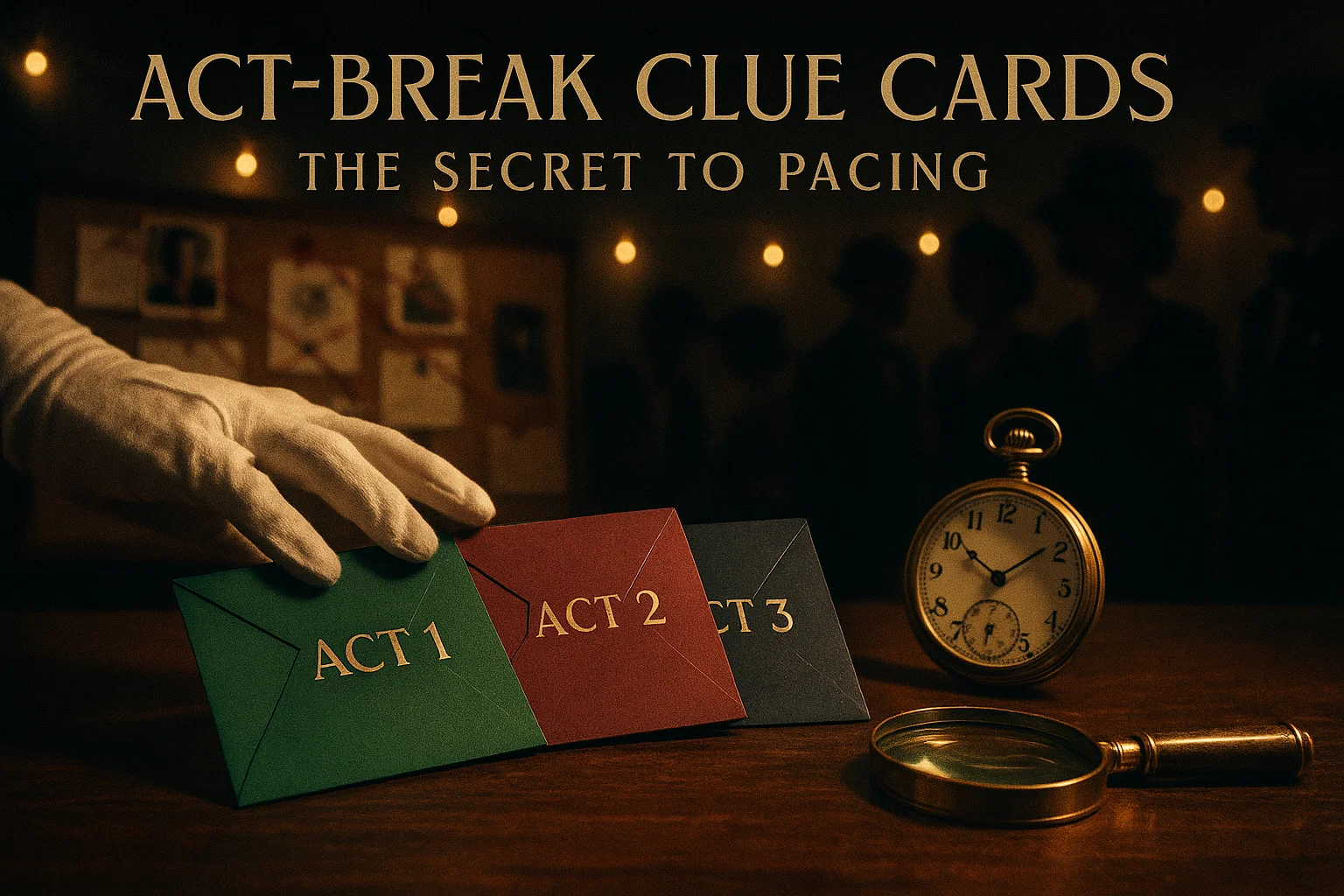Act-Break Clue Cards: The Secret to Pacing Your Mystery Party

Act-Break Clue Cards: The Secret to Pacing Your Mystery Party
Master the art of suspense by revealing clues in perfectly timed acts—no dead air, no info-dumps, just edge-of-your-seat fun.
1. What Are Act-Break Clue Cards?
Act-Break Clue Cards are sealed packets or mini-cards handed to players at specific
points during a murder-mystery party. Each “act” introduces fresh evidence, character revelations,
or plot twists—much like a TV episode turning point. The cards:
- Prevent information overload.
- Create natural pauses for food, photos, or role-play.
- Guarantee every guest stays engaged and curious.
2. Why Good Pacing Makes or Breaks a Mystery
Neuroscience shows that novelty spikes dopamine. If you dump all clues at once, players
peak early and slump. Act-Breaks distribute mini dopamine hits, sustaining energy for
2–3 hours without fatigue. Plus, cliff-hangers tap into our
“Need for Closure”, ensuring guests return from every snack break eager for more.
3. Choosing a 2-, 3-, or 4-Act Structure
| Act Count | Best For | Pacing Highlights |
|---|---|---|
| 2 Acts | Small 4–6 player dinners | Quick reveal, minimal props |
| 3 Acts | Classic 8–12 guest parties | Setup → Complication → Twist |
| 4 Acts | Large or high-difficulty games | Layered subplots, extended tension |
At CapitalOfMystery.com we default to 3 acts—the cinematic sweet spot.
4. Designing Effective Clue Cards
- One New Fact Per Card – avoid walls of text.
- Bold Headline – “Fingerprints Found on Revolver”.
- Brief Context – 30–40 words explaining significance.
- Player Prompt – “Confront anyone who handled the weapon.”
- Act & Order Marker – color-code or label A1, A2, A3.
5. Timing Guidelines & Sample Schedule
Rule of Thumb: Each act ≈ 35–40 minutes.
| Clock | Action |
|---|---|
| 7:00 PM | Welcome & Act 1 cards |
| 7:40 PM | Dinner break |
| 8:00 PM | Act 2 cards + evidence props |
| 8:35 PM | Dessert / photo booth |
| 8:55 PM | Act 3 final cards & accusations |
| 9:20 PM | Solution reveal & awards |
6. Printing, Packaging, & Presentation Tips
- Card Size: 3″×5″ index cards fit envelopes and pockets.
- Envelope Colors: Different hue per act for zero mix-ups.
- Seal with Wax Stickers: Cheap, dramatic, prevents peeking.
- Use a Vintage Tray: Hand out cards like a maître d’ presents menus.
7. Host Techniques for Seamless Transitions
- Announce a “last-call” warning five minutes before each act ends.
- Play a short audio sting or dim lights to signal envelope time.
- Collect completed cards in a labeled box—avoids table clutter.
- Keep a spare set in case of spills or lost clues.
8. Troubleshooting Pacing Pitfalls
Guests stuck? Offer an optional hint card, but deduct points to maintain stakes.
Running late? Merge minor Act 2 clues into Act 3 to compress time without dropping the twist.
FAQs
How many clue cards per act?
4–6 cards for 8–12 players strikes a balance between detail and digestibility.
Can players swap cards?
Yes—encourage trading to boost social interaction, unless a clue states “secret.”
What if someone opens an envelope early?
Issue a playful “penalty,” such as losing a bonus token, to reinforce rules without killing fun.
